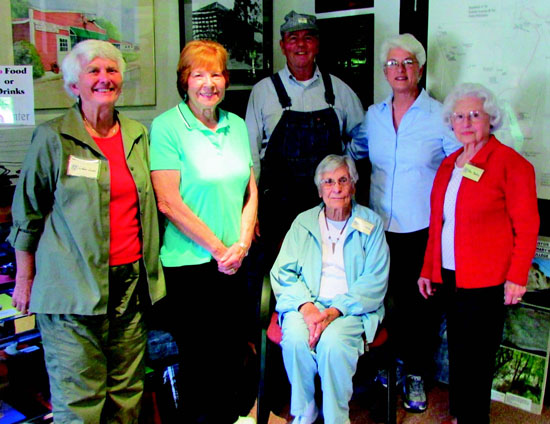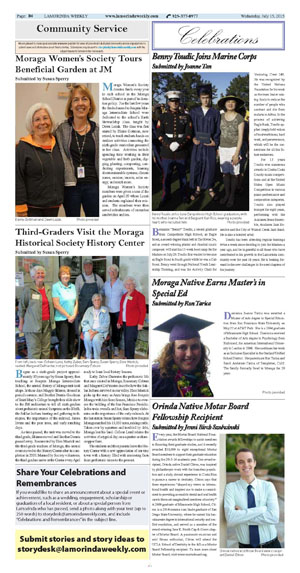|
|
Published July 15th, 2015
|
Third-Graders Visit the Moraga Historical Society History Center
|
|
| Submitted by Susan Sperry |
 |
| From left, back row: Colleen Lund, Kathy Zuber, Sam Sperry, Susan Sperry, Elsie Mastick; seated: Margaret DePriester; not pictured: Rosemary Coburn Photo provided |
Begun as a sixth-grade project approximately 30 years ago by Susan Sperry, then teaching at Joaquin Moraga Intermediate School, the annual History of Moraga unit took shape. In those days Maggie Skinner, dressed in period costume, and Brother Dennis Goodman of Saint Mary's College brought their slide show to the JM auditorium to tell all sixth-graders about prehistoric animal footprints on the Bluffs, the Saklan Indians hunting and gathering techniques, the importance of the railroad, James Irvine and the pear trees, and early ranching days.
 As time passed, the unit was moved to the third grade, Skinner moved and Brother Dennis passed away. Resurrected by Elsie Mastick and the third-grade teachers of Moraga, this annual event moved to the History Center after its completion in 2000. Manned by Society volunteers, the third-graders arrive at the Center every April ready to learn local history lessons.
As time passed, the unit was moved to the third grade, Skinner moved and Brother Dennis passed away. Resurrected by Elsie Mastick and the third-grade teachers of Moraga, this annual event moved to the History Center after its completion in 2000. Manned by Society volunteers, the third-graders arrive at the Center every April ready to learn local history lessons.
 Kathy Zuber illustrates the prehistoric life that once existed in Moraga; Rosemary Coburn and Margaret DePriester describe how the Saklan Indians survived in our valley. Elsie Mastick picks up the story as Anza brings Jose Joaquin Moraga with him from Sonora, Mexico to oversee the building of the San Francisco Presidio. In his train overalls and hat, Sam Sperry elaborates on the importance of the early railroads. At the last station Susan Sperry relates how Joaquin Moraga ranched his 13,000 acres, raising cattle. Taken over by squatters and troubled by debt, Moraga lost his land. Colleen Lund relates the activities of a typical day on a squatter or sharecropper farm.
Kathy Zuber illustrates the prehistoric life that once existed in Moraga; Rosemary Coburn and Margaret DePriester describe how the Saklan Indians survived in our valley. Elsie Mastick picks up the story as Anza brings Jose Joaquin Moraga with him from Sonora, Mexico to oversee the building of the San Francisco Presidio. In his train overalls and hat, Sam Sperry elaborates on the importance of the early railroads. At the last station Susan Sperry relates how Joaquin Moraga ranched his 13,000 acres, raising cattle. Taken over by squatters and troubled by debt, Moraga lost his land. Colleen Lund relates the activities of a typical day on a squatter or sharecropper farm.
 The students and their parents leave the History Center with a new appreciation of our tiny town with a history filled with interesting facts from prehistoric times to the present.
The students and their parents leave the History Center with a new appreciation of our tiny town with a history filled with interesting facts from prehistoric times to the present.

|
|
|
|
|
|
|
|
|
| |
|
|
|
|



